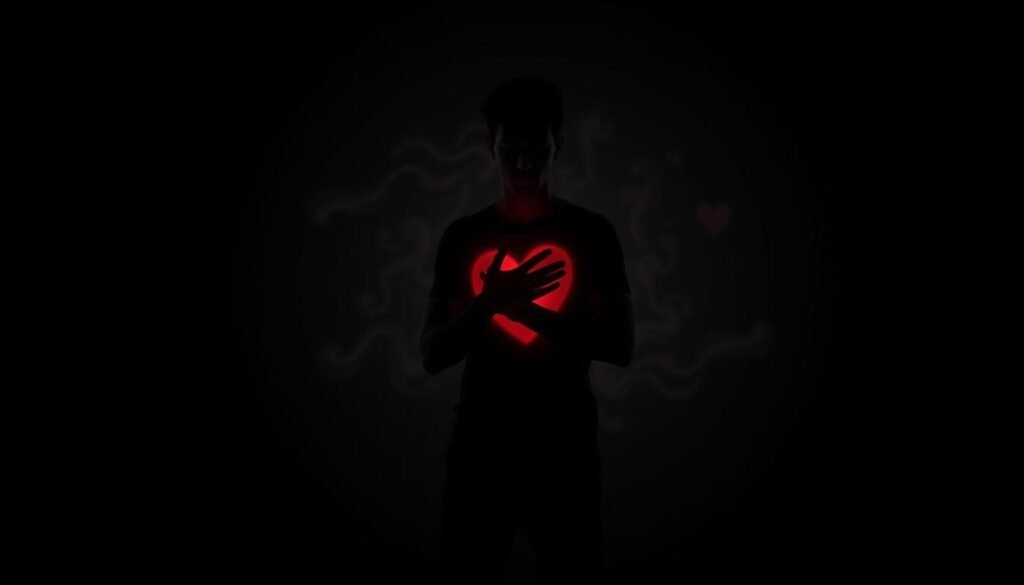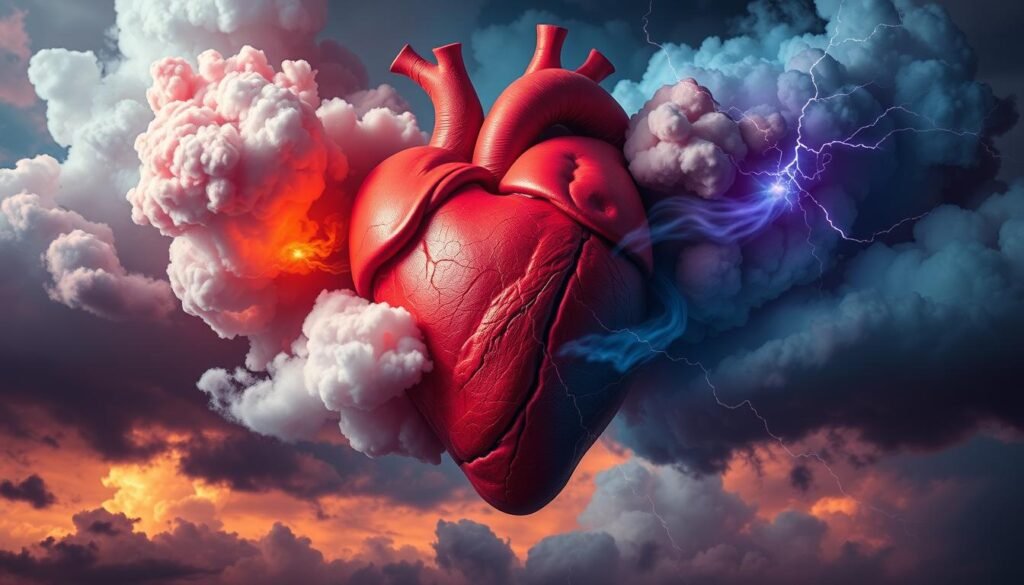Did you know that nearly 5% of U.S. adults might face panic disorder in their lives? This number shows how closely anxiety and physical health issues, like chest pain, are linked. People with chest discomfort often wonder if it’s anxiety or heart pain. This confusion can be dangerous. Knowing the key signs of both conditions is vital. Symptoms like shortness of breath can happen in both a heart attack and an anxiety attack. Learning about the differences between each is key to getting the right medical help.
Key Takeaways
- Nearly 3% of U.S. adults experience panic disorder yearly. This shows how big of an issue mental health really is.
- Chest pain could mean a panic attack or heart attack. This makes diagnosis complex.
- Knowing the difference between anxiety pain and heart attack signs can save lives.
- Women’s heart attack symptoms might include nausea and back pain, different from men’s.
- If you have unusual symptoms, seeing a doctor immediately is crucial for the right diagnosis.
- Managing stress well can lower the risk of feeling anxious and keep your heart healthier.
Understanding Anxiety and Its Symptoms
Anxiety is a condition that leads to fear, worry, and unease. It can impact daily life and happiness. Learning about its symptoms helps us tell it apart from other issues, especially when stressed.
What is Anxiety?
Many people suffer from anxiety in different ways. It brings physical and emotional issues, making everyday tasks hard. Anxiety disorders can cause panic attacks. These are bursts of fear that peak quickly.
Common Anxiety Symptoms
The symptoms of anxiety differ from person to person. Some common ones are:
- Chest pain or discomfort
- Shortness of breath
- Dizziness or lightheadedness
- Increased heart rate or palpitations
- Sweating or trembling
- Nausea or gastrointestinal distress
- Feelings of choking or tightness in the throat
About 30-40% of people with non-heart chest pain have anxiety. It’s important to know these symptoms to avoid confusion about heart health. In the ER, nearly half of chest pain cases are not heart-related. It shows the importance of knowing if it’s anxiety.
Panic attacks can feel like anxiety but are intense and sudden. They may include a fast heartbeat, hard breathing, and fear. Knowing how to handle these symptoms can improve your life.
Overview of Heart Pain and Heart Attack Symptoms
A heart attack happens when a part of the heart doesn’t get enough blood due to a blockage. Knowing the early signs of a heart attack is key to getting the right treatment quickly. This knowledge can make a big difference in how well someone recovers.
It’s important to tell heart attack symptoms apart from other types of chest pain.
What is a Heart Attack?
A heart attack, or myocardial infarction, occurs when blood supply to the heart is reduced or stopped. This can harm or kill the heart muscle. It’s a serious situation that needs fast action, especially for those showing clear symptoms.
Key Symptoms of Heart Attacks
Heart attack symptoms come in many forms:
- Chest pain or discomfort that feels like pressure, tightness, squeezing, or aching
- Pain spreading to the shoulder, arms, back, neck, jaw, teeth, or upper abdomen
- Shortness of breath, which may occur with or without chest discomfort
- Fatigue and feelings of nausea or lightheadedness
- Cold sweats and a rapid heartbeat
Here is a table comparing heart attack signs to other chest pain causes:
| Symptom | Heart Attack | Other Causes |
|---|---|---|
| Chest Pain | Pressure or tightness | Pain may change with position |
| Pain Location | Spreads to left arm, neck, jaw | Localized to specific area |
| Shortness of Breath | Common, often severe | May accompany anxiety or panic |
| Nausea | Possible symptom | Less likely, often related to digestion |
| Duration of Symptoms | Lasts for several minutes | May resolve quickly or be chronic |
Understanding heart attack symptoms is crucial. It can lead people to get help faster. Since chest pain is a common emergency, knowing these signs can save lives. It’s vital to recognize and act on these symptoms quickly for the best care.
The Overlapping Symptoms of Anxiety and Heart Pain
Anxiety can often be confused with heart-related issues. Recognizing their overlapping symptoms is key for the right diagnosis and treatment. This section looks at their common signs, like chest pain. It shows why it’s vital to know the differences between symptoms of anxiety and those of heart issues.
Similarities in Symptoms
Anxiety and heart problems can both show up as chest pain and other scary symptoms. Common signs include:
- Chest discomfort
- Shortness of breath
- Heart racing
- Sweating
- Feelings of impending doom
Chest pain from anxiety often feels sharp because of muscle tension. It may come and go quickly, making it hard to know exactly where it’s coming from. On the flip side, heart pain might last longer. It often feels like a pressure or a squeeze in the chest. This pain might also move to areas like the arm or jaw.
Recognizing the Differences
It’s important to know the unique traits of these conditions to choose the right action. Anxiety pain can pop up suddenly during stressful times or panic attacks. But heart symptoms might show up when you’re physically active or after eating a lot. Getting a professional’s opinion with chest pain is crucial to avoid serious heart problems.
In anxiety cases, it’s common to see blood pressure rise and heart rate increase due to stress. These changes can make anxiety feel even worse. Knowing these signs can help you decide when to use coping methods or see a doctor.
Signs Chest Pain from Anxiety vs Heart Issues
It’s vital to know the difference between chest pain from anxiety and heart problems. The way chest pain feels can tell us a lot. Knowing if the pain is sharp or dull, where it hurts, and what causes it can help find the cause. Also, how long the pain lasts and what triggers it matters a lot in finding out if the pain is from anxiety or heart issues.
Physical Characteristics of Chest Pain
Chest pain from panic attacks is usually sharp. It often goes away in a few minutes. However, chest pain from heart issues feels like heavy pressure. It’s mainly on the left side of the chest. This kind of pain can last longer or come and go, making it hard to tell apart from panic-related pain. Below is a table that highlights these differences:
| Characteristic | Anxiety (Panic Attack) | Heart Attack |
|---|---|---|
| Nature of Pain | Sharp or shooting | Pressure or squeezing |
| Duration of Chest Pain | Minutes to an hour | May last longer |
| Physical Triggers | Emotional stress | Physical exertion |
| Location | Center or left side of the chest | Left side or under the breastbone |
Duration and Triggers of Chest Pain
Panic attacks bring sudden, intense fear and chest pain. They often start from stress or anxiety. But heart attacks come from physical strain affecting the heart. Knowing how long the pain lasts and what causes it helps decide when to get medical help.

How Panic Attacks Differ from Heart Attacks
It’s essential to know how panic attacks differ from heart attacks. Both conditions are scary, with symptoms that can seem similar. Knowing about panic attacks helps manage them better.
Common Signs of Panic Attacks
Panic attacks happen suddenly and cause a lot of fear or anxiety. They usually last for a short time. Some common signs are:
- Racing heartbeat
- Sweating
- Trembling or shaking
- Sensation of impending doom
- Chest pain description varying from sharp to stabbing
These attacks can happen without warning and are often caused by stress. They might occur a few times a year, with each one feeling different.
How Pain Feels During an Attack
Panic attacks and heart attacks feel different. During a panic attack, the chest pain is sharp. Heart attacks make your chest feel tight or crushed. Heart attacks also cause intense pain that can spread to your arms or jaw.
Knowing these differences is important. If you’re ever unsure about your chest pain, get medical help right away. Learning about panic attacks shows how crucial therapy or medication can be. For more details, visit this resource.
The Role of Stress in Anxiety and Heart Issues
Stress is key in both anxiety and heart health. It’s important to understand the effects of emotional and chronic stress. Knowing how they connect helps manage stress better.
Emotional Stress and Panic Attacks
Emotional stress can make anxiety worse, leading to panic attacks. These attacks can cause heart palpitations. They come quickly and go away fast. Nearly 1 in 5 people in the US are affected by anxiety disorders. Knowing what causes your anxiety is crucial. For tips on handling stress, effective methods are available to ease anxiety symptoms.
Chronic Stress and Cardiovascular Health
Chronic stress hurts heart health. It can cause heart attacks, abnormal heartbeats, and strokes. Long-term stress leads to too much stress hormones, like epinephrine and cortisol. This can cause artery inflammation, leading to atherosclerosis. Also, stress might lead people to unhealthy habits. These habits can harm the heart. Managing stress carefully and living a healthy lifestyle are key for those at risk.

When to Seek Medical Evaluation
Knowing when to get a medical check-up for chest pain is key. Some symptoms to never ignore signal serious issues needing quick help. Spotting these signs early can save lives.
Symptoms to Never Ignore
Chest pain has many causes, from heart to non-heart related. Immediate medical help is needed for certain symptoms:
- Severe chest pain or discomfort that feels like pressure or squeezing
- Having trouble breathing or catching your breath
- Pain that spreads to the back, neck, jaw, or arms
- Feeling suddenly nauseous or dizzy
- Pain that doesn’t get better with rest
In the U.S., over 6.5 million people go to the ER each year because of chest pain. This shows how important it is to talk to a doctor soon. It’s even more critical for those with health issues like high blood pressure or diabetes.
Consultation with Healthcare Professionals
Talking to a doctor when you feel bad is vital. They might run tests like EKGs, bloodwork, or scans to find the cause. Things like GERD or anxiety have treatments, but heart problems may need more care.
Acting quickly on chest pain checks for both stress and heart issues. Always get checked when symptoms show up. Doing so can lead to better chances of being healthy.
Managing Anxiety and Reducing the Risk of Heart Problems
Managing anxiety well is key to a healthy heart. Using stress relief techniques can lower anxiety. This helps reduce heart issues. Cognitive behavioral therapy is effective for chest pain from anxiety and panic attacks.
Effective Stress Management Techniques
There are many ways to handle anxiety well. These methods include:
- Deep breathing exercises: They quickly lessen anxiety symptoms.
- Physical activity: Working out helps lower anxiety and boosts heart health.
- Mindfulness practices: These help you understand and accept your feelings, which helps control anxiety.
- Therapeutic consultations: Experts offer advice and treatments suited to you.
Using these strategies helps manage anxiety, creates peace of mind, and improves heart health.
Healthy Lifestyle Choices for Heart Health
Choosing a heart-healthy lifestyle is vital. Here are some important choices:
| Healthy Choice | Benefits |
|---|---|
| Balanced Diet | Keeps the heart healthy and mood stable. |
| Regular Exercise | Builds fitness and lowers anxiety. |
| Avoiding Smoking | Lessens heart disease risk and improves breathing. |
| Getting Enough Sleep | Better mental and physical health. |
Making healthy lifestyle changes benefits those with anxiety. These choices help in controlling anxiety and are crucial in lowering heart issues. Managing anxiety and heart health together is very important.

Understanding Risk Factors for Both Conditions
It’s key to know the risk factors for anxiety and heart disease to improve health. Genetics, how we live, and stress impact both greatly. Knowing these can help people prevent mental and heart problems. Studies show a strong link between anxiety and heart disease, highlighting the need for careful checks.
Identifying Personal Risk Factors
Everyone should be aware of their own risk factors for anxiety and heart disease:
- Genetic predisposition: Family history is vital in both.
- Lifestyle choices: Bad habits like poor eating, no exercise, and smoking increase risks.
- Chronic stress: Constant stress harms mental and physical health, leading to negative effects.
The Connection Between Anxiety and Heart Disease
Studies show the link between anxiety and heart disease, and how anxiety can make heart issues worse:
- People with anxiety are 26% more likely to get heart disease.
- Stressed individuals often neglect good health habits, harming heart health.
- Dealing with both anxiety and heart disease significantly boosts the risk of disability and death versus heart disease alone.
Conclusion
Understanding signs of anxiety and chest pain is key for good health. About 25% of people with chest pain have panic disorders. This shows the need to know the symptoms of both anxiety and heart attacks. It’s important to recognize these signs early.
Timely medical checks can confirm if it’s a heart attack or not. This is critical because heart attacks are a major health risk. So, spotting these signs early can save lives.
To manage anxiety and heart issues, one should adopt healthier lifestyles, consider therapy, and possibly medication. People with panic disorder are more likely to get high blood pressure and heart disease. Treating both conditions is crucial.
Distinguishing between heart attack and anxiety pain is important for better health results. Heart attack pain is usually constant and feels like pressure. Anxiety-related chest pain tends to be sharp and focused in one area.
For more information, check out this summary of anxiety and heart pain. Learning when to seek medical help for unclear symptoms is vital. It’s a step towards taking control of your health and improving your well-being.